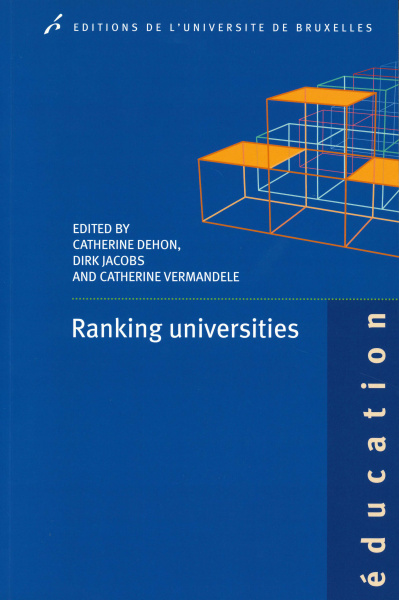Ranking universities
Première édition
University rankings are “hot”. Some universities, policy makers and journalists seem to take them quite seriously. At the same time, however, they are also fiercely criticized. The best known worldwide rankings tend, for instance, to have a strong anglo-saxon bias and tend to give insufficient valorisation to human sciences. Lire la suite
Are improvements and alternatives to rankings possible? Should universities care about rankings and let them influence their practices? Parallel to international rankings, research assessments have become increasingly important in several countries. What are the current practices of research evaluation? What are the challenges, obstacles and advantages? How should one assess the quality of research in a fair and equitable way?
In this book a number of leading European experts share their thoughts and research findings on these issues. The approach of existing global university rankings is clearly unsatisfactory but this does not mean that all ranking exercises are pointless. Furthermore, we simply cannot afford to ignore the need for research assessment if we want to uphold quality standards at our higher education institutes. Merely relying on bibliometrics is problematic - even if we can overcome the current anglo-saxon bias in citation indices. Both research evaluation strategies as rankings endeavours have most to gain from a multiple criteria approach.
The contributions in this book are a selection of papers which were presented at the International Colloquium on “Ranking and Research Assessment in Higher Education”, which took place on 12 and 13 December 2007 at the Université Libre de Bruxelles. The conference was organized within the framework of the annual meeting of the European PhD in Socio-Economic and Statistical Studies and was hosted by the Faculty of Social and Political Sciences and the Solvay Brussels School of Economics and Management.
Spécifications
- Éditeur
- Éditions de l'Université de Bruxelles
- Édité par
- Catherine Dehon, Dirk Jacobs, Catherine Vermandele,
- Avant-propos de
- Véronique Halloin,
- Contributions de
- Philippe Aghion, Roel D. Bennink, Sonja Berghoff, Koenraad Debackere, Mathias Dewatripont, Gero Federkeil, Wolfgang Glänzel, Seamus Hegarty, Caroline Hoxby, Michel Lubrano, Andreu Mas-Colell, André Sapir, Philippe Vincke,
- Langue
- anglais
- Site web ressource
- Oapen.org
- Catégorie (éditeur)
- > Business & Économie
- BISAC Subject Heading
- BUS024000 BUSINESS & ECONOMICS / Education
- Code publique Onix
- 06 Professionnel et académique
- CLIL (Version 2013-2019 )
- 3305 SCIENCES ECONOMIQUES
- Subject Scheme Identifier Code
- Classification thématique Thema: Economie de secteurs spécifiques
Livre broché
- Date de publication
- 02 mars 2009
- ISBN-13
- 978-2-8004-1441-6
- Ampleur
- Nombre de pages de contenu principal : 132
- Code interne
- 1441
- Format
- 160 x 240 x 12 cm
- Poids
- 246 grammes
- ONIX XML
- Version 2.1, Version 3
Google Livres Aperçu
Sommaire
- Acknowledgements
- Foreword | Véronique HALLOIN
- Ranking and research assessment in higher education: current and future challenges | Catherine DEHON, Dirk JACOBS and Catherine VERMANDELE
- University rankings | Philippe VINCKE
- Evaluating research in Dutch universities: fifteen years of nationwide peer-review | Roel D. BENNINK
- The Dutch research assessment exercise. An evaluator's point of view | Seamus HEGARTY
- The CHE approach | Sonja BERGHOFF and Gero FEDERKEIL
- On the "multi-dimensionality" of ranking and the role of bibliometrics in university assessment | Wolfgang GLÄNZEL and Koenraad DEBACKERE
- A statistical approach to rankings: some figures and explanations for European universities | Michel LUBRANO
- Why reform Europe's universities? | Philippe AGHION, Mathias DEWATRIPONT, Caroline HOXBY, Andreu MAS-COLELL and André SAPIR
- Biographical notes

